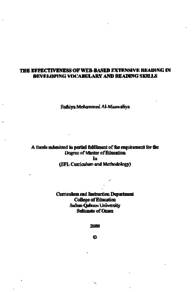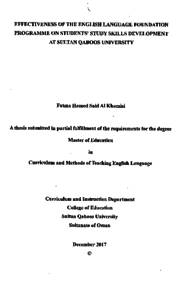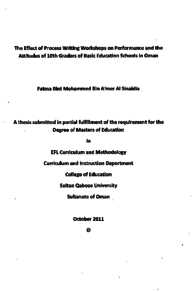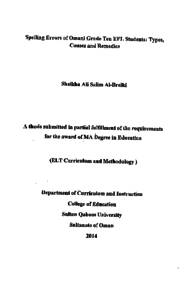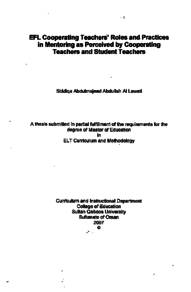Document
The effectiveness of web-based extensive reading in developing vocabulary and reading skills
Publisher
Sultan Qaboos University
Gregorian
2008
Language
English
Subject
English abstract
The present study investigates the effectiveness of a Web-based extensive reading programme in developing Grade 9 Basic Education students' vocabulary and improving their reading comprehension skills.
The population of this study was Grade 9 Basic Education Cycle 2 male and female students taking English as a foreign language (EFL) semester 2 course during the academic year 2008-2009. Four Grade 9 classes, 120 male and female students in all, from four different schools in the Muscat region-Al-Seeb area represented the study sample. Sixty male and female students from two selected schools formed the experimental groups, which participated in the Web-based extensive reading programme. Sixty students from two other schools formed the control group, which participated in the traditional extensive reading cards programme.
Three types of instruments were used to test the research hypotheses. First, a vocabulary and reading comprehension test was used to measure the students' vocabulary, reading comprehension, and proficiency. Second, a vocabulary knowledge scale (VKS) adopted from Paribakht and Wesche (1997) was used. The VKS consisted of eight familiar words and two target words administered at the beginning of the programme, and ten target words administered after the treatment. The scale rated their knowledge of each word on a 5-point scale. This instrument was used as a tool to measure the depth of their vocabulary knowledge. Third, an attitude questionnaire was used to assess the students' attitudes towards Web-based extensive reading. The statistical analysis of the data revealed the following results:
The results of the vocabulary growth of familiar and target words test (match word with definition and VKS) analysis revealed that learners who participated in the Web-based extensive reading programme showed greater vocabulary growth than those of their in-class counterparts who participated in the extensive reading cards programme. The results of the reading comprehension test indicate that the Web-based extensive reading programme was effective and resulted in greater reading
comprehension scores than the traditional extensive reading cards programme.
• The results of the attitude questionnaire "analysis revealed that students (experimental groups) had very positive attitudes towards Web-based extensive
reading.
The findings of this study encouraged the researcher to recommend important research areas for further investigation on EFL Web-based learning (WBL).
Member of
Resource URL
Category
Theses and Dissertations

